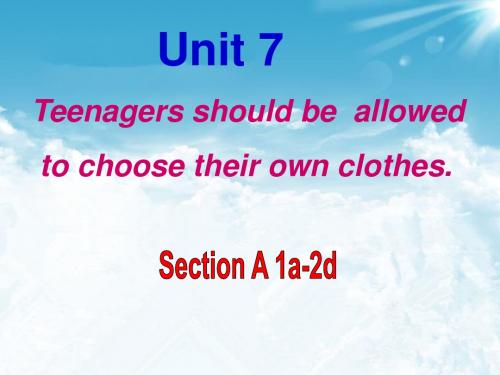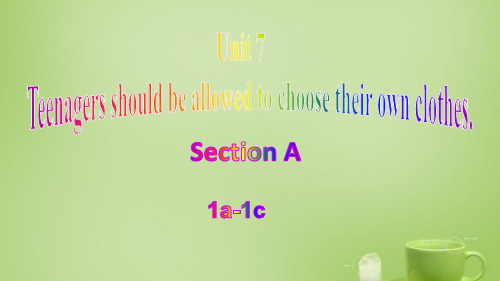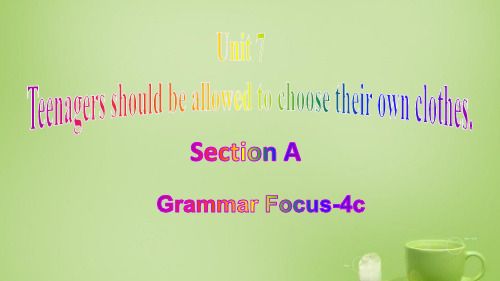九年级人教版英语Unit7SectionA语法总结
人教版英语九年级上册 Unit 7 Section A (3a-3c)

Look at the picture and the structure of the passage, discuss the following questions.
1. What kind of text are we going to read? 2. What do you think the poem is about? 3. Do you remember what your mother do when
keep silent
talk back
have a discussion
➢ How do you feel after watching the video?
➢ Have you ever had the same experiences as the girl in the video?
➢ Have you ever quarreled with your mom? Do you think you and your mother understand each other?
人教版英语九年级上册
Unit 7 Teenagers should be allowed to choose their own clothes.
Section A (3a-3c)
Learning Goals
➢ Key words & phrases: tiny, cry, field, hug, lift, badly, talk back, awful, teen, regret, poem.
Mom Knows Best When I was a tiny baby crying all night, my mom sang to me and stayed by my side. When I was tired and hungry, she gave me food and warm arms to sleeping in. When I was two running through the field, she made sure I was safe and kept me from danger. When I fell and hurt myself, she gave me a hug and lifted me up.
2014人教版新目标英语九年级unit_7_Section_A_1a--2d

Sixteen-year-olds shouldn't be allowed to get their ears pierced.不应该允许16岁的孩子穿耳洞。 get one’s ears pierced 意为“打耳洞”,get是 使役动词, 相当于make和have,意为“使; 让”。“get / have+宾语+过去分词”是一个常见 的固定搭配,意为“使某事被做”或“请人做某 事;”。something与done逻辑上为动宾关系。”
Unit 7
Teenagers should be allowed to choose their own clothes.
should be allowed to do sth shouldn’t be allowed to do sth
应该被允许做某事
不应该被允许做某事
allow (to let sb. do sth.)及物动词,意为“允许;准 许”,常用于下列结构中: ① allow sb. to do sth. 允许某人做某事 例: The teacher allowed him to go into the classroom. 老师允许他进教室。
Go and get your hair cut.去找人理一下发。
get用于使役动词还可用于get sb. to do sth.结构,意为“使某人做某事”
例:I can’t get him to change his idea.
我不能使他改变想法。
choose clothes
Teenagers should be allowed to choose their own clothes.
1. Talk about what you are allowed to do or not. 2. Talk about if you agree or disagree with something.
九年级英语:Unit 7 section A(人教版九年级上)

Section A
peaceful
relaxing
beautiful
fascinating
jungle
boring
educational
beautiful educational fun
relaxing peaceful boring
___ a 2. Mexico ___ c 3. Niagara Falls
a. We don’t know the language. b. It’s too touristy. c. There’s not much to do there.
— Where would you like to go on vacation,Sam? —I’d like to trek through the jungle in Brazil, because I like exciting vacations —What about you? —I like places where the weather is always warm. —Where would you go / visit ? —I hope to see Niagara.
2b Listen again. Why do the people decide not to visit these places? Match each place with a reason. Place Reason not to visit the place
b 1. Hawaii ___
C 3. Would you ________ help me? A. like C. like to B. to like D. want
人教版英语九年级全册Unit7SectionA(GrammarFocus4c)优秀教学案例

1. 教师邀请学生总结过去式的被动语态的知识点和运用方法。
2. 学生分享自己的总结,教师给予肯定和补充。
3. 教师通过思维导图或板书,总结过去式的被动语态的构成规则、用法和常见短语。
4. 教师强调过去式的被动语态的重要性和实用性,激发学生运用该语法知识进行实际交流的欲望。
(五)作业小结
1. 教师布置相关的作业,让学生巩固和应用过去式的被动语态的知识。
2. 作业包括练习题、写作任务和实际生活中的应用等,提高学生的综合运用能力。
3. 教师鼓励学生自主学习,引导他们通过查阅资料、与他人交流等方式,进一步拓展和加深对过去式的被动语态的理解。
4. 教师提醒学生在下节课前准备好相关内容,为接下来的学习做好充分准备。
2. 教师引入过去式的被动语态的概念,解释其构成规则和用法。
3. 教师通过示例句子,展示过去式的被动语态的构成和用法,如:“The cake was baked by the teacher.”。
4. 教师讲解过去式的被动语态的常见短语和搭配,如:“be famous for”,“be interested in”等。
5. 教学策略的灵活运用:本案例中,教师根据学生的实际情况和学习需求,灵活运用了情景创设、问题导向、小组合作和反思与评价等多种教学策略。这些教学策略的灵活运用使得课堂更加生动有趣,提高了学生的学习效果和兴趣,同时也培养了学生的综合能力。
3. 教师对学生的学习过程和结果进行评价,关注学生的成长和进步,给予鼓励和指导。
4. 采用多元化的评价方式,如观察、交流、测试等,全面了解学生的学习情况,提高教学效果。
四、教学内容与过程
(一)导入新课
1. 教师通过展示一幅图片或播放一段视频,引发学生对过去式的被动语态的兴趣。例如,展示一张学校运动会的照片,让学生观察并描述照片中的事件。
人教版九年级英语第七单元Unit 7 section A 知识点精讲

人教版九年级英语第七单元Unit 7 section A 知识点精讲Section A单词1.license /'laɪsns/ n.(= licence)证;证件助记li/laɪ/ +cen/sn/+se/s/= license典例driver's license驾照business license营业执照拓展license vt.批准;许可2. safety / 'seɪfti/ n.安全;安全性助记safe(adj.安全的)+y(名词后缀)= safety典例Pay attention to the food safety, please.请注意食品安全联想safely adv.安全地3. smoke / sməʊk/ v.吸烟;冒烟n.烟典例Can I smoke in the dining hall?(动词)我能在餐厅里抽烟吗?Smoke is coming out of the chimney.(名词)烟正从烟囱里冒出来名言No smoke without fire.无风不起浪4.cry /kaɪ/ v.&n.哭;叫喊典例Mom, my little sister is crying all the time.(动词)妈妈,我的小妹妹一直在哭He heard a cry for help and rushed out.(名词)他听到一声呼救声,然后就冲出去了短语cry out大声呼喊5.field/fi:ld/ n.田野;场地典例in the fields在田地里on the football field在足球场上拓展field n.(某一)领域in the field of在…方面,在……领域6.hug /hʌg/ n.&v.拥抱;搂抱典例warm hugs(名词)温暖的拥抱hug tightly(动词)紧紧地拥抱注意hug的过去式和过去分词均为hugged,现在分词为hugging7. lift /lɪft/ v.举起;抬高n.电梯;搭便车典例He was too weak to lift his hand.(动词)他太虚弱了而无法抬起他的手。
Unit 7 Section A (Grammar Focus-4c) 课件人教版九年级英语全册

4b Fill in the blanks with the correct forms of the words in brackets.
However, in most Asian societies, it is not common for teenagers to ____m_o_v_e___ (move) out. Chinese parents believe that it is better for children to live with parents who can ____ta_k_e____ (take) care of them. But the young should then look after their parents as they get older. That is why many Chinese adults __c_o_n_t_in_u_e__ (continue) to live with their parents.
New Words
community n. 社区;社团 keep…away from 避免接近;远离
chance n. 机会;可能性 make one’s own decision 自己做决定
educate v. 教育;教导 manage v. 完成;应付 society n. 社会
What rules do you have at school?
Do you think teenagers _m_u_s_t_b_e_k_ep_t_a_w_a_y_f_ro_m__t_he__In_t_er_n_e_t _? chance n. 机会;可能性
5. Parents should give teenagers chances to make their own decisions. Teenagers _s_h_ou_l_d_b_e_g_iv_e_n_c_h_a_n_c_es_t_o_m__ak_e_t_h_ei_r_o_w_n_d_e_c_is_io_n_s__.
Unit 7 Section A(1a-1c)九年级英语全册(人教版)

get a driver`s license
1. They aren’t _s_e_r_io_u__s enough.
get their ears pierced
choose their own clothes
2. They are _to_o__y_o_u_n_g_.
3. Just want to make sure you get _s_o_m_e_t_h_i_n_g_n_i_c_e_.
Picasso, anyway ➢Useful expressions: allow sb to do sth, allow doing sth,
(sb) be allowed to do sth ➢Sentences:
① I’m really excited about seeing the famous paintings by Picasso. ② Do you think we may be allowed to take photos if we don’t use a flash?
1. Who has just got the driver’s license? John.
2. Why does Anna’s mother want to go shopping with her?
She just wants to make sure Anna gets something nice.
➢Function: Talk about what you are allowed to do; agree and disagree ➢Grammar: The structure and expression of “ should + be allowed to”. ➢Curriculum words: license, safety, smoke, part-time, pierce, no way,earring, flash,
Unit 7 Section A(Grammar focus-4c)九年级英语全册(人教版)

3. 你认为应该鼓励青少年去自己做决定吗? Do you think teenagers __sh_o_u__ld_b_e_e_n_c_o_u_r_a_g_e_dto make their own decisions?
4. 不,我不认同这个。青少年还太小不能自己做决定。 No, I don’t agree with this. Teenagers are ____ ______ _t_oomyaokuentghetior own decisions.
day?
一般疑问句
Sentence pattern(句式)
肯定句结构: My homework should be done (by me) every day.
主语 +情态动词+be+done +(by+宾语)+其它
否定句结构:
My homework should bneotdone (by me) every day. 主语+情态动词+not+be done+其它
You and your friend are starting an English club. Make a list of rules about what should and should not be allowed.
Tips: 1. Work in groups. Choose one of the activities we just mentioned above. And then discuss the rules about what we should and should not be allowed to do in this activity. 2. The rules would require usage of the modals should and must.
- 1、下载文档前请自行甄别文档内容的完整性,平台不提供额外的编辑、内容补充、找答案等附加服务。
- 2、"仅部分预览"的文档,不可在线预览部分如存在完整性等问题,可反馈申请退款(可完整预览的文档不适用该条件!)。
- 3、如文档侵犯您的权益,请联系客服反馈,我们会尽快为您处理(人工客服工作时间:9:00-18:30)。
Unit7Section AStudents are not allowedto drink and smoke.③be (not) allowed to do sth. (不) 被允许做某事例:Passengers are not allowed to smoke.不允许乘客吸烟。
3. I’m worried about your safety. 我担心你的安全。
(2) safety名词,意为“安全;安全性”,其常用短语in safety 意为“处于安全状态”。
例:I will answer for her safety.我将对她的安全负责。
The children are now in safety.孩子们现在安全了。
1. Teenagers should not be allowed to smoke.2. Sixteen-year-olds should be allowed to drive.3. Students should not be allowed to have part-time jobs.1)part-time jobs是合成形容词,意为“兼职的;业余的;非全日制的”,其反义词是full-time,意为“全职的;全日制的”。
例:In America many students are part-timeworkers.在美国,许多学生是兼职工作者。
(2)job可数名词,意为“工作”,指零散的、具体的工作。
其近义词为work,是不可数名词,其常用短语为at work,意为“在工作”。
例:He looked for work for several monthsand at last he found a job most suitablefor him.他一连找了好几个月的工作,最后找到了一份适合自己的工作。
4. Sixteen-year-olds should be allowed to get their ears pierced.get one’s ears pierced 意为“打耳洞”,此处get为使役动词,相当于make和have,意为“使;让”。
“get / have+宾语+过去分词”意为“使某事被做”或“让某人做某事”。
例:You’d better go and get your hair cut.it’s too long.你最好去把头发理了。
它太长了。
5.Teenagers should be allowed to choose their ownclothes.1)choose及物动词,其后可接名词或代词作宾语。
例:He chose a good job last year.去年他选择了一份好工作。
①choose to do sth.例:He chose to go there by air.他决定乘飞机去那里②choose+特殊疑问词+to do例:You will have to choose which one to buy.你将不得不选择买哪一个。
(2)own 此处用作形容词,意为“自己的;本人的”,常用在形容词性物主代词或所有格之后,以加强语气。
还可用作代词,意为“属于自己的东西”。
常用结构“one’s own +sth.”表示”某人自己的……”,相当于“sth.+of one’s own”。
例:This is your own duty. Don’t be angrywith others.这是你自己的责任。
不要迁怒于他人。
I want to have a big house of my own.我想有一所属于自己的大房子。
1. No way !没门No way 意为“不可能;决不;不行;没门”,多用于口语中,表示某人不可能做某事或某事不可能发生。
例:----Can I leave now? 我可以现在离开吗?----No way! 不行!1b1.Anna can go to the shopping centerby bus.2. Anna wants to get her ears pierced.3. Anna wants to choose her own clothes.1cA: I don’t think sixteen-year-oldsshould be allowed to drive.B: I agree. They aren’t serious(1)sixteen-year-olds名词,意为“16岁的青少年”,相当于sixteen-year-old boys and girls。
sixteen-year-olds,sixteen-year-old与sixteen years old.sixteen-year-olds“16岁的青少年”,是名词,在“基数词-名词(单数)-形容词”结构中,形容词后加-s表示一类人或事物。
例:Sixteen-year-olds should be allowed togo out at night.应该允许16岁的青少年夜间外出。
②sixteen-year-old“16岁的”,是由“基数词-名词(单数)-形容词”构成的复合形容词,在句中通常做前置定语,修饰名词。
例:My pen pal is a sixteen-year-old boy.我的笔友是一个16岁的男孩。
③sixteen years old“16岁”,用来描述人的年龄,常在句中作表语。
例:My brother is sixteen years old.我哥哥十六岁了。
2a1.Sixteen-year-olds should not be allowed to work at night.rry shouldn’t work every night.3.He should cut his hair.4. He should stop wearing that silly earring.(1)stop doing sth. 意为“停止正在做的事情”。
例:Let’s stop talking!让我们停止说话吧!2)stop to do sth 指停止手头所做的事情去做另外一件事情例:The two girls stopped talking when theysaw me.那两个女孩看到我时停止了讲话。
I stopped to talk to him when I saw him.我看到他时停下来去和他讲话。
(2)silly为形容词,意为“愚蠢的;傻的;可笑的”。
例:It was silly of you to trust him.你信任他,真是愚蠢。
5. He doesn’t seem to have many friends.=_____________Seem to do sth /it seems that2bIt looks cool.Young people need to sleep.He needs to spend time with friends.He needs time to do homework.It doesn’t look clean.2dSandy: I’m really excited about seeing thefamous paintings by Picasso. (1)be/get excited about意为“对……感到兴奋”,其中about后可接名词、代词或动词-ing形式。
例:She got excited about it as soon as she heardabout the good news.她一听到那个好消息,就变得很兴奋。
Are you excited about going to Shanghai?你对去上海感到兴奋吗?(2)excited意为“兴奋的;激动地”,主语常常为人。
exciting意为“令人激动的”,主语常为物。
例:We were very excited when we won thefirst prize.当我们赢得一等奖使,我们很激动。
The football match was very exciting.那场足球赛非常激动人心的。
Wu Lan: Me, too! I’m glad Mr. Smith chose theart museum for our school trip this year.Sandy: I’m going to bring my new camera totake lots of photos!Wu Lan: Oh, no. Mr. Smith says we must nottake photos. It’s not allowed in themuseum.Sandy: That’s too bad! Do you think we mightbe allowed to take photos if we don’tuse a flash?Wu Lan: Hmm ... I think they just want toprotect the paintings.So if you don’t use alight, then it mightbe OK.Sandy: Yeah. I think weshould be allowedto do that. I’ll bringmy camera anyway.3aMom Knows BestWhen I was a tiny baby crying all night, mymom sang to me and stayed by my side.(1)tiny (very small in size or amount)形容词,意为“极小的;微小的”。
例:The baby put his tiny hand in mine.那个婴儿把小手放在我的手中。
(2)cry此处用作不及物动词,意为“哭;叫喊”。
例:Don’t cry. Your mom is coming.别哭了!你妈妈来了cry可用作名词,意为“叫喊;大喊;哭”。
例:When he heard a cry for help, he run out as quickly as he could.听到呼救声,他尽可能快地跑了出去。
When I was tired and hungry, she gave me foodand warm arms to sleep in.When I was two running through the field, shemade sure I was safe and kept me from danger.When I fell and hurt myself, she gave me a hugand lifted me up.(1)hug( an act of putting your arms around sb. and holding them tightly)此处作名词,意为“拥抱;搂抱”。
